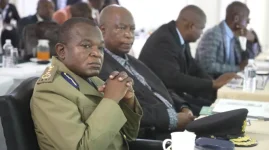ZRP spokesperson Commissioner Paul Nyathi warns that fake products threaten the existence of local businesses across Zimbabwe. He shared this message at a National Economic Consultative Forum meeting about counterfeits held yesterday in Harare. The event focused on fighting fake goods and helping economic growth through government-wide efforts.
Commissioner Nyathi pointed out that counterfeiting affects every part of the economy. Fake fertilizers, seeds, and farm chemicals flood markets nationwide. People even import ox-drawn plows from other countries despite local companies' ability to make them here. Counterfeit medicines create major health risks for citizens.
Some individuals sell drinks they falsely claim can heal people without approval from health authorities. Fake car parts have entered shops, which might cause more crashes on roads. Police have caught people making counterfeit brakes and brake fluid. Customers fall for these tricks because the packaging looks just as good or better than real products.
Attempts to stop these dishonest practices haven't worked well enough. This shows how complicated the problem is - laws aren't enforced strongly, buyers don't know what to watch for, and many people want cheaper options. Commissioner Nyathi stressed that ignoring this issue could destroy Zimbabwe's manufacturing base completely.
He added that security concerns arise when criminals bring fake vaccines into the country. Some dealers make between $20,000 and $60,000 weekly from these illegal sales. At the same meeting, Amos Marawa from the President's Office explained that fake goods harm public health, consumer safety, industrial competition, and market integrity.
The global impact of counterfeits costs billions of dollars and affects millions of jobs yearly. Zimbabwe faces these same challenges. Marawa called for teamwork among policymakers, business leaders, police, and other stakeholders to create lasting solutions to this crisis.
Buy Zimbabwe CEO Alouis Burutsa asked for immediate action since government tax revenue has dropped sharply due to counterfeiting and informal business growth. He requested stronger punishments through the Ministry of Justice, noting the current system makes little sense when someone caught with wildlife faces nine years in jail, but those hurting the economy pay only $30 fines.
Burutsa suggested treating these offenders as economic saboteurs with appropriate penalties. Worldwide, trade in fake products has expanded rapidly, creating serious problems by undermining legitimate companies, destroying jobs, and reducing tax money governments need to function properly.
Commissioner Nyathi pointed out that counterfeiting affects every part of the economy. Fake fertilizers, seeds, and farm chemicals flood markets nationwide. People even import ox-drawn plows from other countries despite local companies' ability to make them here. Counterfeit medicines create major health risks for citizens.
Some individuals sell drinks they falsely claim can heal people without approval from health authorities. Fake car parts have entered shops, which might cause more crashes on roads. Police have caught people making counterfeit brakes and brake fluid. Customers fall for these tricks because the packaging looks just as good or better than real products.
Attempts to stop these dishonest practices haven't worked well enough. This shows how complicated the problem is - laws aren't enforced strongly, buyers don't know what to watch for, and many people want cheaper options. Commissioner Nyathi stressed that ignoring this issue could destroy Zimbabwe's manufacturing base completely.
He added that security concerns arise when criminals bring fake vaccines into the country. Some dealers make between $20,000 and $60,000 weekly from these illegal sales. At the same meeting, Amos Marawa from the President's Office explained that fake goods harm public health, consumer safety, industrial competition, and market integrity.
The global impact of counterfeits costs billions of dollars and affects millions of jobs yearly. Zimbabwe faces these same challenges. Marawa called for teamwork among policymakers, business leaders, police, and other stakeholders to create lasting solutions to this crisis.
Buy Zimbabwe CEO Alouis Burutsa asked for immediate action since government tax revenue has dropped sharply due to counterfeiting and informal business growth. He requested stronger punishments through the Ministry of Justice, noting the current system makes little sense when someone caught with wildlife faces nine years in jail, but those hurting the economy pay only $30 fines.
Burutsa suggested treating these offenders as economic saboteurs with appropriate penalties. Worldwide, trade in fake products has expanded rapidly, creating serious problems by undermining legitimate companies, destroying jobs, and reducing tax money governments need to function properly.












